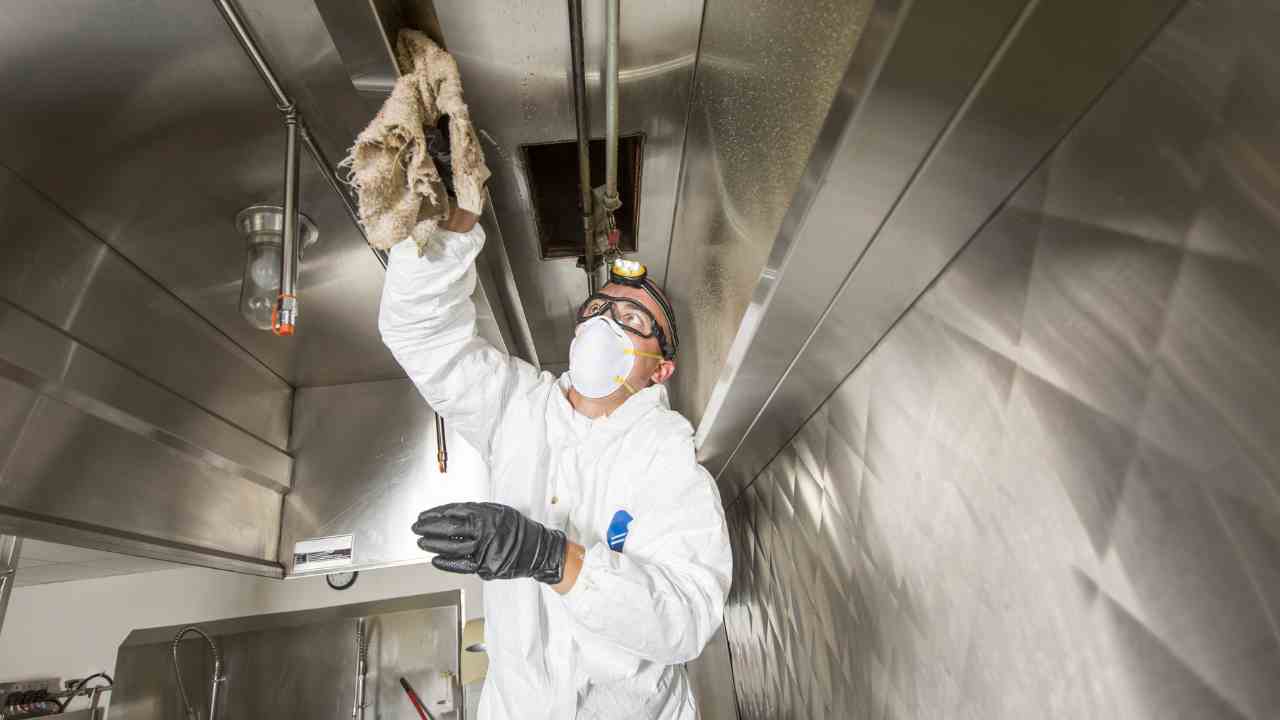Recommended Intervals for Cleaning Kitchen Exhaust

Ontario-wide Kitchen Exhaust and Hood Cleaning – Best prices and service guaranteed.
Keeping a clean and well-maintained kitchen exhaust system is crucial for both the safety and efficiency of any commercial kitchen. Regular cleaning of the kitchen exhaust not only prevents the buildup of grease and other contaminants but also reduces the risk of fire hazards. However, determining the appropriate intervals for cleaning the kitchen exhaust can be a challenge. In this article, we will explore the recommended intervals for cleaning kitchen exhaust systems, backed by research, industry standards, and case studies.
The Importance of Cleaning Kitchen Exhaust
Before delving into the recommended intervals for cleaning kitchen exhaust, it is essential to understand why regular cleaning is necessary. The kitchen exhaust system plays a vital role in removing smoke, heat, and odors from the cooking area. However, during the cooking process, grease, oil, and other particles are released into the air and can accumulate within the exhaust system.
Over time, this buildup of grease and contaminants can lead to several issues:
- Increased fire risk: Grease is highly flammable, and if it accumulates within the exhaust system, it can become a significant fire hazard. According to the National Fire Protection Association (NFPA), nearly one-third of restaurant fires are caused by grease buildup in the kitchen exhaust system.
- Reduced airflow: The accumulation of grease and debris in the exhaust system can restrict airflow, reducing the system’s efficiency. This can lead to poor ventilation, increased energy consumption, and an uncomfortable working environment for kitchen staff.
- Poor air quality: A dirty kitchen exhaust system can release contaminants back into the kitchen, compromising the air quality. This can have adverse effects on the health and well-being of both employees and customers.
Given these potential risks, it is crucial to establish appropriate intervals for cleaning the kitchen exhaust system to ensure its optimal performance and safety.
Ontario-wide Kitchen Exhaust and Hood Cleaning – Best prices and service guaranteed.
Industry Standards and Guidelines
Several industry organizations and regulatory bodies have established standards and guidelines for the cleaning of kitchen exhaust systems. These standards provide valuable insights into the recommended intervals for cleaning and help ensure compliance with local regulations. The two most prominent organizations in this field are the National Fire Protection Association (NFPA) and the International Kitchen Exhaust Cleaning Association (IKECA).
NFPA 96: Standard for Ventilation Control and Fire Protection of Commercial Cooking Operations
The NFPA 96 is the standard for ventilation control and fire protection of commercial cooking operations. It provides guidelines for the design, installation, operation, inspection, and maintenance of commercial kitchen exhaust systems. According to NFPA 96, the frequency of cleaning depends on the type of cooking and volume of grease produced.
Here are the recommended cleaning intervals outlined in NFPA 96:
- Monthly cleaning: Systems serving solid fuel cooking operations.
- Quarterly cleaning: Systems serving high-volume cooking operations, such as 24-hour cooking, charbroiling, or wok cooking.
- Semi-annual cleaning: Systems serving moderate-volume cooking operations.
- Annual cleaning: Systems serving low-volume cooking operations, such as churches, day camps, seasonal businesses, or senior centers.
It is important to note that these intervals are general recommendations and may vary depending on local regulations and specific circumstances. It is always advisable to consult local authorities and industry professionals to determine the appropriate cleaning intervals for a particular kitchen exhaust system.
Ontario-wide Kitchen Exhaust and Hood Cleaning – Best prices and service guaranteed.
IKECA: International Kitchen Exhaust Cleaning Association
The International Kitchen Exhaust Cleaning Association (IKECA) is a non-profit organization dedicated to the prevention of fires and the promotion of kitchen exhaust system cleanliness. IKECA provides guidelines and best practices for the cleaning and maintenance of kitchen exhaust systems.
While IKECA does not provide specific cleaning intervals, it emphasizes the importance of regular cleaning based on the accumulation of grease. IKECA recommends conducting a thorough inspection of the kitchen exhaust system at least every six months to determine the appropriate cleaning frequency.
During the inspection, factors such as the type of cooking, volume of grease produced, and the condition of the exhaust system are taken into account to determine the cleaning intervals. This approach ensures that the cleaning frequency is tailored to the specific needs of each kitchen.
Ontario-wide Kitchen Exhaust and Hood Cleaning – Best prices and service guaranteed.
Case Studies and Statistics
Real-world case studies and statistics can provide valuable insights into the impact of regular cleaning intervals on kitchen exhaust system performance and safety. Let’s explore a few examples:
Case Study 1: Restaurant A
Restaurant A is a busy establishment serving a variety of cuisines. The kitchen exhaust system had not been cleaned for over a year, and grease buildup was visible in the ductwork. The restaurant experienced a fire incident caused by the ignition of accumulated grease in the exhaust system.
Lesson learned: Neglecting regular cleaning intervals can lead to severe fire hazards and endanger the safety of the establishment, employees, and customers.
Case Study 2: Restaurant B
Restaurant B follows the recommended cleaning intervals outlined in NFPA 96. The kitchen exhaust system is cleaned quarterly due to the high-volume cooking operations. Regular cleaning has resulted in improved airflow, reduced odors, and a safer working environment.
Lesson learned: Adhering to recommended cleaning intervals can enhance the efficiency of the kitchen exhaust system, improve air quality, and reduce fire risks.
Ontario-wide Kitchen Exhaust and Hood Cleaning – Best prices and service guaranteed.
Regular cleaning of the kitchen exhaust system is essential for maintaining a safe and efficient commercial kitchen. The recommended intervals for cleaning depend on factors such as the type of cooking, volume of grease produced, and local regulations. Industry standards, such as NFPA 96 and guidelines from organizations like IKECA, provide valuable insights into the appropriate cleaning intervals.
By following these recommendations and conducting regular inspections, kitchen operators can ensure that their exhaust systems are clean, safe, and in compliance with regulations. Neglecting regular cleaning intervals can lead to increased fire risks, reduced airflow, and poor air quality. Real-world case studies and statistics further emphasize the importance of regular cleaning intervals in preventing fire incidents and maintaining optimal kitchen exhaust system performance.
Remember, a clean kitchen exhaust system is not only a legal requirement but also a crucial step in ensuring the safety of your establishment, employees, and customers.
Learn more about “How often should Kitchen Exhaust be cleaned” right here.
Frequently asked questions about Recommended Intervals for Cleaning Kitchen Exhaust.

How often should I clean my kitchen exhaust system?
The recommended interval for cleaning your kitchen exhaust system is every three to six months. However, the frequency of cleaning may vary depending on the type of kitchen, the volume of cooking, and the type of food being prepared. For high-usage commercial kitchens or establishments serving greasy and oily foods, more frequent cleaning may be necessary to ensure optimal performance and safety.
What are the consequences of not cleaning my kitchen exhaust system regularly?
Neglecting regular kitchen exhaust cleaning can lead to various consequences, such as reduced ventilation efficiency, increased fire hazards, and health risks. Over time, grease and debris buildup in the exhaust system can obstruct airflow, causing smoke, odors, and heat to remain in the kitchen. The accumulated grease also becomes a significant fire hazard, as it can ignite easily and spread rapidly throughout the ductwork. Additionally, airborne grease particles and bacteria can contaminate the kitchen environment, affecting food quality and safety.a
Can I clean the kitchen exhaust system myself, or should I hire a professional service?
While some minor cleaning tasks can be performed by kitchen staff, it’s highly recommended to hire a professional exhaust cleaning service for a thorough and safe cleaning process. Professional technicians have the knowledge, tools, and expertise to disassemble and clean all components of the exhaust system properly. They can also identify potential issues and ensure compliance with local fire safety codes. Attempting a DIY cleaning without proper training and equipment may lead to inadequate results and could pose safety risks.
How does regular kitchen exhaust cleaning impact energy efficiency and cost savings?
Regular kitchen exhaust cleaning positively affects energy efficiency and cost savings in several ways. As grease and debris accumulate in the exhaust system, it obstructs airflow and forces exhaust fans to work harder to maintain proper ventilation. This increased strain on the fans leads to higher energy consumption and increased utility costs. By cleaning the system regularly, you improve airflow, reduce fan workload, and enhance overall energy efficiency, resulting in potential cost savings over time.
Are there any specific regulations or standards that dictate the cleaning frequency for kitchen exhaust systems?
Yes, there are industry-specific regulations and standards that dictate the cleaning frequency for kitchen exhaust systems. The National Fire Protection Association (NFPA) Standard 96: Standard for Ventilation Control and Fire Protection of Commercial Cooking Operations provides guidelines for the proper maintenance and cleaning of kitchen exhaust systems. Additionally, local fire codes and health departments may have specific requirements that establishments must follow. It’s essential for business owners and operators to familiarize themselves with these regulations and adhere to the recommended cleaning intervals to ensure compliance and safety.
- hood cleaning
- kitchen exhaust cleaning
- Recommended Intervals for Cleaning Kitchen Exhaust
- restaurant hood cleaning







